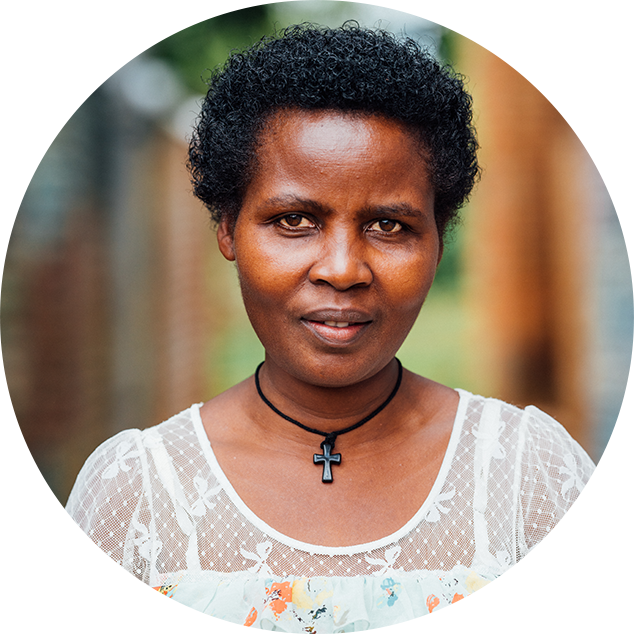Lorem ipsum dolor sit amet, consectetur adipiscing elit. Cras sollicitudin, tellus vitae condimentum egestas, libero dolor auctor tellus, eu consectetur neque.
Her Story
Appolinarie Mukarugira
Artisan
In the summer of 2015, Abahizi Rwanda was behind on its production schedule and put out a call for temporary workers. Appolinarie applied. She thought that a bit of extra cash could give the family some financial breathing room, and then life would return to normal. To her surprise, Appolinarie liked the work right away, and especially enjoyed the camaraderie with other women. A few weeks later, Abahizi Rwanda offered an opportunity to take the sewing test required for a permanent position.
Her husband protested immediately: It was impossible—how could she continue to work all day and take care of the land, the children, and the cows? She said, “I knew I couldn’t argue with him. I had to show him!” Rising early and staying up late, she kept up with everything. She was careful to always respect him, and made sure he felt that he was still the head of the family. “I hear stories about bad husbands all the time,” she said. Appolinarie had a good husband, and his happiness was important. By the time the test came around, he was on board. The household was running smoothly, the school fees were paid, and there was money left over to improve their home. The family now has a new kitchen, and they are gradually replacing the mud-brick walls and dirt floor with bricks. Soon, they hope to have a solar panel to provide electricity.
Appolinarie feels her voice is heard on all of the important household decisions.
Appolinarie is an artisan in the beading department. When we visited in July of 2016 her team was preparing to begin work on a beaded clutch for the holiday season. The clutch required 10,000 beads to be hand-sewn, and each bag took a worker between nine and twelve days to produce. Appolinarie enjoys the intricate work and imagines that the women who will buy the bags as very wealthy. She says a prayer each day that kate spade new york customers will keep buying Abahizi Rwanda’s products.
When asked what might be next, Appolinarie answered quickly: “Rabbits.” The whole family loves rabbit meat, but it is expensive. So she is saving to purchase two rabbits, which will quickly become more. The children will have fun caring for them, and dinner will be healthy and delicious.
Appolinarie no longer tends the land or cares for the cows. As she progressed at Abahizi Rwanda and her salary increased, a young man was hired. In addition to paying him for doing chores, Appolinarie’s family is paying for him to attend school and learn how to read and write.



